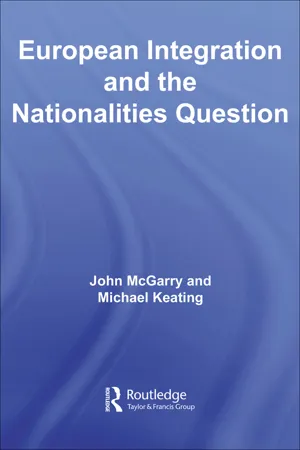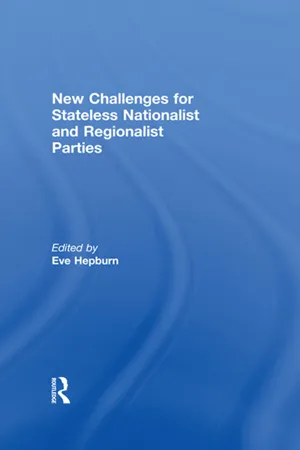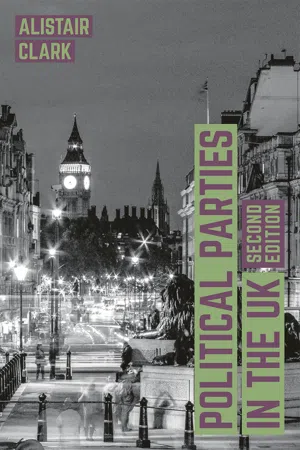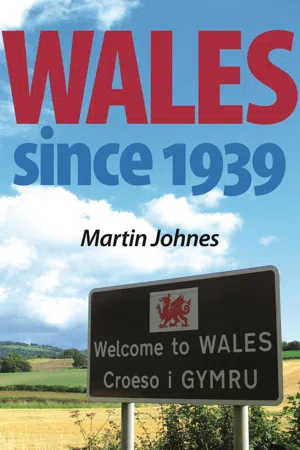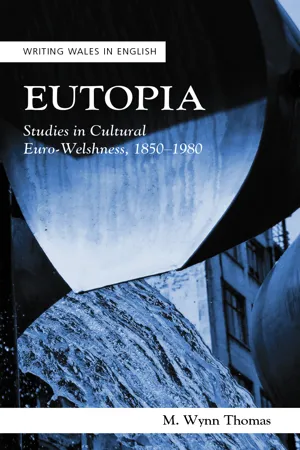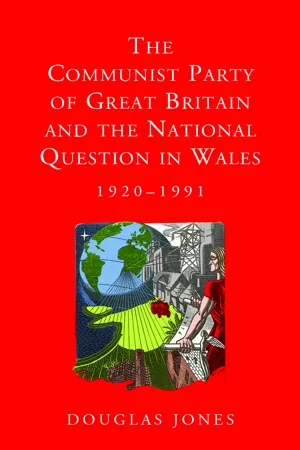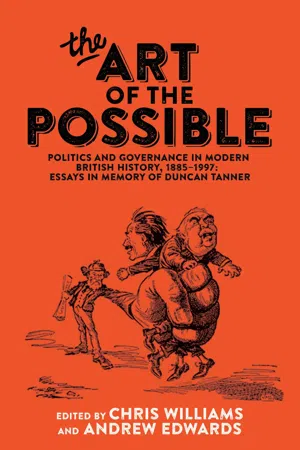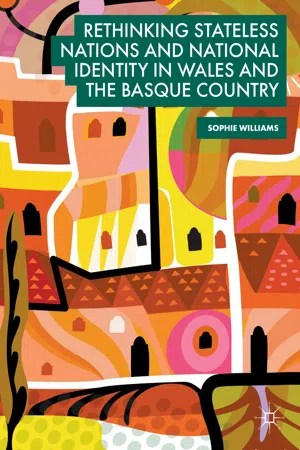Politics & International Relations
Plaid Cymru
Plaid Cymru is a political party in Wales that advocates for Welsh independence and the promotion of the Welsh language and culture. It was founded in 1925 and has been a significant force in Welsh politics, advocating for devolution and greater autonomy for Wales within the United Kingdom. The party's policies also focus on social justice, environmental sustainability, and economic development in Wales.
Written by Perlego with AI-assistance
Related key terms
Related key terms
1 of 4
Related key terms
1 of 3
10 Key excerpts on "Plaid Cymru"
- John McGarry, Michael Keating(Authors)
- 2006(Publication Date)
- Routledge(Publisher)
This chapter will argue, however, that rather than signalling a radical new departure in Plaid Cymru’s attitude towards European integration, ‘independence’ is the latest attempt by the party to reconcile a normative project for the recognition of the ‘nationalities question’ (Keating 2004a) on the supranational level, with the more problematic reality of a European polity in which the role for these historic nations is not clear. Building upon a deeply rooted ideological commitment to an international context for Welsh self-determination, Plaid Cymru has fashioned a European discourse which, by the 1990s, established an intrinsic link between the two processes of self-determination and European integration. In order to understand the trajectory of this discourse, however, it is necessary to examine the changing political and institutional contexts in which it has been forged. Of interest in this respect are developments on the Welsh and British levels, as much as on the European one. As such, it will be argued that changes in Plaid Cymru’s European discourse over time reflects the emergence and closure of different political opportunity structures in different political spheres, and the responses made by the party to these opportunities. Finally, it will be suggested that, contrary to what the slogan ‘independence in Europe’ has suggested to many commentators, Plaid Cymru’s conceptualisation does not necessarily equate to sovereign statehood, and as such, the terminological change in describing the party’s long-term constitutional objective does not betray the party’s post-sovereigntist legacy. On the contrary, it represents the most recent attempt by a party committed in principle to Welsh self-government in a European framework to reconcile the challenges of being a non-state actor in a state-dominated political world without actually having to become a state itself.The historical and ideological origins of Plaid Cymru
Plaid Cymru was established in 1925 in response to the rapidly changing socioeconomic, political, cultural and religious conditions in Wales in the immediate post-First World War period (Morgan 1981: chap. 7), as an expression of rising fears over the future of the Welsh culture, language and way of life. To this extent, Plaid Cymru’s early years were dominated by cultural and linguistic considerations, couched in the conservative Catholicism of its leader at the time, the poet and prominent cultural figure Saunders Lewis.2- eBook - ePub
Minority Nationalist Parties and European Integration
A comparative study
- Anwen Elias(Author)
- 2009(Publication Date)
- Routledge(Publisher)
The chapter argues that these various attempts at making sense of European integration reflect an ongoing struggle within Plaid Cymru to reconcile a fundamental ideological commitment to Wales as a European nation with the ever-changing dynamics of Welsh, British and European politics. At times, the political context in these three political arenas has made it easy to translate this principled support for European co-operation into a concrete project that sets out the opportunities for the Welsh nation within the framework of the EEC and, after 1992, the EU. At other times, however, the dynamics of party competition at home and developments on the supranational level have made it very difficult for Plaid Cymru to defend a political project that posits a strengthening of Welsh self-government within a framework of European co-operation. The case of Plaid Cymru demonstrates clearly that, whilst basic party ideology dictates the broad parameters of minority nationalist party attitudes towards European integration, the substance of European policy is contingent on the shorter-term changes in domestic and European politics. The latter in particular has played a determining role in shaping Plaid Cymru’s attitude towards European integration.The Origins and Development of Plaid CymruPlaid Cymru was established as a result of the joining of forces of two smaller nationalist groups, the Welsh Nationalist Party and Mudiad Cymreig. Most commentators divide Plaid Cymru’s subsequent evolution into three periods: from 1925 to 1939 under the leadership of Saunders Lewis; from 1945 to 1981 under the leadership of Gwynfor Evans; and from 1981 onwards with Dafydd Wigley and Dafydd Elis Thomas alternating as party presidents (Christiansen, 1998; McAllister, 2001; Gwilym, 2000; Wyn Jones, 2007).In its earliest years, Plaid Cymru was first and foremost a pressure group for the protection and promotion of the Welsh language, its political agenda informed by the Catholic conservatism of the poet and prominent cultural figure, Saunders Lewis (Wyn Jones, 1999). However, for the first forty years of its existence, the party made very little impact upon the Welsh political scene, due to a combination of lack of members, lack of finance and lack of political motivation (Davies, 1983: 262). Gwynfor Evans’s presidency from 1945 until 1981 was characterised by an attempt to bring Plaid Cymru out of the political and electoral wilderness. Party energies and resources were focused on fighting elections and contesting an incremental number of parliamentary constituencies. Plaid Cymru also abandoned the ideological purity of its forefathers and adopted a more detailed socio-economic programme inspired by the principles of ‘community socialism’. As a result, ‘Plaid Cymru’s politics became more practical, more concrete, and more “normal”’ (Wyn Jones, 1999: 189). By the end of the 1960s, this was a strategy that seemed finally to be paying off, bringing to an end the period of ‘drift and fragmentation’ (Butt Philip, 1975: 85) that had characterised Plaid Cymru’s political fortunes in the post-war era. Plaid Cymru won its first Westminster parliamentary seat in the 1966 Carmarthen by-election. This was followed by further electoral successes in the late 1960s and 1970s in local and general elections (Butt Philip, 1975: 105–23; McAllister, 2001: 112–13). - Eve Hepburn(Author)
- 2013(Publication Date)
- Routledge(Publisher)
The territorial dimension to Plaid Cymru ’s nationalist project returned to the fore in the party’s annual conference that year. A motion was approved that replaced the constitutional terminology of “full national status in Europe” with a commitment to “independence in Europe”. The election of Dafydd Iwan as the party’s new President—a life-long Plaid activist, language campaigner and major figure on the Welsh cultural scene—also represented a desire by party activists to re-assert the centrality of traditional ‘ Plaid ’ issues to the Welsh nationalist project. Table 1. National Assembly for Wales election results, 1999–2007 However, this retreat to traditional ideological politics was temporary. Despite an equally disappointing performance in the 2005 general election, Plaid Cymru ’s leadership renewed its efforts to establish the party as a governing alternative within Welsh politics. In February 2006, Plaid Cymru launched a six-month policy consultation with the Welsh people, the objective of which was to identify a more voter-friendly set of policies ahead of the 2007 Assembly election. In the resultant election manifesto, the new goal of “independence in Europe” hardly featured, although the party did commit itself to the pursuit of greater powers for the Welsh Assembly. Instead, the bulk of the document was taken up by the presentation of the party’s new “practical policies” (Ieuan Wyn Jones, quoted in Western Mail, 2007) that were “radical” as well as “credible and deliverable” (Plaid Cymru, 2007). There was no mistaking the message that Plaid Cymru wanted to deliver to the electorate: realistic and workable solutions, not abstract ideology, were what Plaid Cymru had to offer. Whereas the 1999 Assembly election was characterized by Plaid Cymru ’s attempt to position itself vis-à-vis its main state-wide competitors on the territorial and left–right ideological dimensions, by 2007 the party was more preoccupied with pragmatic politics and valence concerns- eBook - ePub
- Alistair Clark(Author)
- 2018(Publication Date)
- Bloomsbury Academic(Publisher)
Plaid Cymru was formed in 1925. Its roots can be traced to cultural nationalist circles in North Wales based around the defence of the Welsh language. For much of its history, Plaid has oscillated between, on the one hand, acting as a pressure group for the defence of Welsh interests, and, on the other, as a party seeking power and influence through contesting elections (McAllister, 2001). According to a major in-depth study of Plaid, its key aim is ‘a new Wales with sufficient powers and authority to make its own decisions as to political organisation and economic and social priorities’ (McAllister, 2001: p.129). This is not necessarily the same as independence for Wales. While some argue the party does favour independence (A. Price, 2010), secession from the UK has been a source of some controversy within Plaid (McAllister, 2001: pp.142–3) and the somewhat ambiguous formulation ‘full national status for Wales within the EU’ has often been used to describe Plaid’s position (A. Price, 2010: p.16). The debate over independence continues within the party. McAngus (2014) notes the passing of a 2011 conference motion committing Plaid to ‘independence for Wales in Europe’, while at the same time observing tensions between a pro-independence wing of the party and a group seeking change through gradually increasing the powers of the Welsh Assembly. More recently, McAngus (2016: p.637) suggests Plaid advocates ‘independent statehood for Wales’.Plaid Cymru can be characterised as being left of centre, with diverse influences deriving from utopianism, anarcho-syndicalism, guild socialism and environmentalism. It committed itself in 1981 to policies which were ‘nationalist, decentralist and socialist’, and, while there was considerable debate within the party as to the merits of describing itself as socialist, this description persists, with Plaid adopting a position of ‘community socialism’ in an attempt to distinguish itself from the Welsh Labour Party while at the same time allowing it to emphasise its concern for Welsh interests (McAllister, 2001: ch. 6). Despite Elias (2009) suggesting that Plaid has moderated its ideological approach in order to become more electable, the party’s position was still summarised in the 2010 election as being ‘left of centre, decentralist, socialist, green, nationalist and internationalist, with a healthy dose of scepticism about free markets and globalisation’ (A. Price, 2010: p.15).Plaid started to break out of its North Wales strongholds in 1959, gaining support in the Labour heartlands of South Wales in that year’s general election. Its first MP was elected in 1966 after a high-profile by-election in Carmarthen, described as a ‘momentous’ breakthrough which changed both internal and external perceptions of the party being a serious Welsh political actor (McAllister, 2001: pp.114–15). This was followed with large swings from Labour to Plaid in two by-elections in 1967–1968. From 1970 onwards, Plaid has contested every Welsh seat, winning three seats in the October 1974 election on 10.8 per cent of the Welsh vote. Although falling back in the 1980s, in the 1990s Plaid won four seats in both 1992 and 1997 on 9–10 per cent of the Welsh vote. More recently, Plaid achieved 11.3 per cent of the Welsh vote in 2010 and 12.1 per cent in 2015, winning three seats in both general elections. In 2017 Plaid polled 10.4 per cent, but won four seats. - eBook - ePub
- Philip Jenkins(Author)
- 2014(Publication Date)
- Routledge(Publisher)
for Plaid) as a protest against economic policies. There was also increasing outrage at the successive local government scandals associated with Labour, though the media underplayed this element. Newspapers and television thus reinforced the picture of an upsurge in national consciousness, with Plaid as its vehicle, and the bombers as a genuinely dangerous fringe. This nationalist movement appealed to younger voters, and it attracted many of the energies that elsewhere went into radical movements like ecology and feminism. Plaid was an early practitioner of the community politics that would so often be advocated in the 1980s.Plaid Cymru never fulfilled its early promise, but its achievements were striking. The party’s support in general elections fell gradually, from a peak of 175,000 votes in 1970 to a mere 124,000 in 1987: 11.5 per cent of the Welsh vote compared to 7.3 per cent; but this was sufficient to establish them as a parliamentary presence. Since 1974, they have always held either two or three Welsh constituencies. Carmarthen fell to Gwynfor Evans once more in 1974, though it returned to Labour in later years. Much more reliable was the nationalist fortress in the north-west. Since 1974, the party has always held Caernarfon and Merionethshire (Meirionydd Nant Conwy), respectively the seats of Dafydd Wigley and Dafydd Elis Thomas. The taking of Anglesey (Ynys Mon) in 1987 essentially gave Plaid the whole of traditional Gwynedd, with the exception of the east Caernarvonshire strip that makes up the Conwy constituency. The achievement owed much to the vagaries of the British electoral system, which favours a party with a strong local base over one that has more widely disseminated support. In both 1983 and 1987, the Liberal/SDP Alliance won about a fifth of the Welsh vote in each election, and gained respectively two and three seats: the same as Plaid, which received under eight per cent.The rise of Plaid raises important questions about the potential of Welsh nationalism, but also about its limitations. The party attracts a protest vote in addition to its nationalist core, but the ‘disaffected’ are not likely to provide a firm base. When Liberal (Alliance/Democrat) support crumbled in the late 1980s, defectors transferred their loyalty not to Plaid, but to the ecological Green Party, which suddenly emerged in the 1989 European elections with almost as many Welsh votes as Plaid. In fact, the upstart Greens outpolled Plaid in three of the four Welsh Euro-constituencies, with only North Wales preventing total humiliation. - eBook - ePub
- Martin Johnes(Author)
- 2013(Publication Date)
- Manchester University Press(Publisher)
108 The uncertainty over the economic future of both rural and industrial communities did not help the party either. While there was always the danger, as happened in the mid to late 1960s, that economic fears might lead to an upsurge in Plaid Cymru votes in the short term, in the longer term they kept people wedded to the safety net that the British welfare state provided. This was evident when Plaid Cymru’s share of the vote in Rhondda West collapsed from 39.9 per cent in the 1967 by-election to 14.1 per cent at the 1970 general election.But attitudes were slowly changing. In 1958 an article in the periodical Wales dismissed nationalists as ‘fellows more inclined to romanticism than realism’ and their ideas as ‘farcical’. The writer said he was proud to be Welsh but the Wales he wanted lay in the ‘future’ not ‘the Druidical past’.109 By the 1970s, while some people still held such attitudes, Plaid Cymru had developed a political base and was a serious force in Wales. Here it was both helped and hindered by the emergence of a violent strand of nationalism. While this may have alienated some potential supporters and increased the ire of parts of the Welsh Labour Party towards Plaid Cymru, it also forced the government to take nationalism seriously and do enough to placate it to ensure that violence did not spread. This contributed to the setting up in 1969 of a royal commission to investigate the possibilities of devolution. Some of the institutional straitjackets that had held Plaid Cymru back were also receding in a climate where nationalism had to be accepted. The Committee for Political Broadcasting, which Plaid Cymru and the Scottish National Party were both denied membership of, decided, without consultation, that for the 1970 general election the nationalist parties could have one five-minute broadcast on both television and radio on their national transmitters. Plaid Cymru pointed out that 10 per cent of the Welsh population could not receive Welsh television broadcasts and others tuned into English transmitters by choice. The Committee, however, decided that only parties which put up fifty candidates could receive UK-wide broadcasts, which immediately discounted Plaid since there were only thirty-six Welsh seats. Two academic commentators noted, ‘even someone with no sympathy for the smaller parties could feel that they were treated less than courteously and fairly’. At the 1970 general election, twenty-five of Plaid’s thirty-six candidates lost their deposits, but the party’s overall vote had doubled since 1966 and it saved its deposit in every one of the six seats where more than 70 per cent of people spoke Welsh. The party was now firmly established as a viable political voice for Welsh-speaking Wales.110 - eBook - ePub
Eutopia
Studies in Cultural Euro-Welshness, 18501980
- M. Wynn Thomas(Author)
- 2021(Publication Date)
- University of Wales Press(Publisher)
It also anticipated the formation of a broad front with a wide range of ‘progressive’ initiatives, from grass-root movements to a variety of radical causes. In these important respects, the new official platform of Plaid brought it into line with the operations of the New Left. The tracing of the consequences of this approach would, however, involve moving beyond the scope of the present volume in order to study the Wales of the Thatcherite decade of the eighties that saw, for instance, the creation of the National Left, the publishing of such periodicals as Arcade and Radical Wales along with the fervid intellectual debates of the influential coteries that supported them, the emergence of a women’s movement within Plaid Cymru, the party’s active support, alongside the unions and the Labour Party, for the miners’ strike, and involvement in a number of local direct actions against factory closures and the like. By the late 1970s such stirrings within Plaid Cymru had attracted the attention, and eventually elicited the committed support, of Raymond Williams, the Cambridge don and cultural theorist of international renown who hailed from Pandy, near Abergavenny. One of Williams’s central contentions was that, contrary to official Marxist theory, culture should not be treated as a mere epiphenomenon and regarded as simply a by-product and useful symptom of the underlying economic relations that were the real agents of social development and political structures. Taking his cue from Gramsci and other European intellectuals who were highly influential in British New Left circles, Williams first borrowed from anthropologists and sociologists a definition of culture according to which it signified every aspect of the way of life of a given community, from the banal to the arcane. He then proceeded to argue that culture, properly conceived, was not a mere passive reflector of socio-economic realities but an agent active in determining their character and their development - Douglas Jones(Author)
- 2017(Publication Date)
- University of Wales Press(Publisher)
It attributed the growth of national consciousness in the post-war era to the impact of national liberation struggles; the continued economic and social exploitation of Wales; disillusionment with right-wing Labour Party policies; and the growth of Plaid Cymru. Plaid’s growth was identified as a particular problem for both the party and the labour movement, its policy platform viewed as a mixture of progressive policies on peace, nuclear weapons, Vietnam, economic planning, railway and pit closures and the Welsh language, but essentially reactionary in relation to the class struggle. 184 Noting that the national dimension of Welsh politics was now here to stay, the party and the labour movement were urged to develop their policy and offer their leadership on the national question, whilst endeavouring to bring the national and working-class movements under one united left-wing leadership. 185 The party itself had to develop its own policy in relation to the powers and functions of a Welsh parliament and its relationship with the rest of Britain; the particulars of a Welsh economic plan; the language question; and its approach to raising the national question within the labour movement. 186 Following further discussion on the national question on the Secretariat in May, the Welsh Committee endorsed a paper outlining its position on the issue at its April meeting in preparation for the PC debate on the national question that month. 187 Encompassing much of what had been included in the January discussion document, the Welsh Committee reiterated that it was vital for the party to engage with the national question and related the growth of nationalism to the crisis of imperialism in Britain and the growth of monopoly capital, which had precipitated economic and social decline in Wales. 188 In particular, the Welsh Committee argued that monopoly capital had had a negative impact on Welsh-language culture, noting that- eBook - ePub
The art of the possible
Politics and governance in modern British history, 1885–1997: Essays in memory of Duncan Tanner
- Chris Williams, Andrew Edwards(Authors)
- 2015(Publication Date)
- Manchester University Press(Publisher)
However, it was viewed more expansively as an anti-Thatcher ‘popular front’ which drew together those with significant gripes about the governance of Wales and Britain: the labour movement, feminist and peace campaigners and Welsh language protesters. Meetings on the National Eisteddfod field at Rhyl in 1985 saw Labour and Plaid Cymru activists united in opposition to Thatcherism, with Hywel Francis, chair of the Congress and later elected as Labour MP for Aberavon, arguing that the miners’ strike ‘created a Welsh unity and identity, overcoming language and geographical differences, which failed to materialise in 1979’. 46 Although the Congress itself dissipated in 1986, it left a legacy of collaboration between Labour and Plaid Cymru activists. This was reinforced by the establishment in Cardiff in 1988 of the Campaign for a Welsh Assembly (CWA) by the local Labour candidate Jon Owen Jones and his Plaid rival, Siân Caiach. The CWA increasingly drew support from sections of the population who had opposed devolution in 1979, and was an important platform for the cross-party collaboration that had previously been largely absent. Other bilingual fora, such as the journal Planet (re-launched in 1985) and the Institute for Welsh Affairs (established 1986) provided multi-party avenues for ‘a regular intellectual challenge to current practice in all those spheres of Welsh life … that impact on our industrial and economic performance’. 47 Not only did Labour and Plaid Cymru have a common enemy that overshadowed their own antagonism, but, crucially, former ‘British centralist’ advocates in the Welsh Labour party were being converted to devolution during the 1980s - Sophie Williams(Author)
- 2018(Publication Date)
- Palgrave Macmillan(Publisher)
…“they’re only a party for Welsh speakers”, that would be…one of their default lines that they will use…shamelessly .However, this position has contradictions; although the interviewee accused ‘Westminster’ parties of negatively branding Plaid Cymru , they in term emphasised the superficiality of the ‘Welshness ’ of these parties, intimating that Plaid Cymru is the only truly Welsh party:MP (22/8/2014): The Labour Party…thinkWalesis a region…of the British state…I don’t believe there is such a thing as theWelsh LabourParty…theWelsh Conservatives, the Welsh LibDems…are branding names which they use to try and deal with the growth of Welshidentityto make the impression that they’re Welsh parties…you’ve got to be honest, it’s been pretty successful…our opponents are very clever in the way they’re able to portray as us something that’s based on blood and soil politics.In arguing that a British party cannot be truly Welsh, and vice versa, as the two are politically incompatible, the message seems to be that, while one side associates the other with a certain kind of Welsh, the other deem that opponents are not Welsh at all, suggesting that the ascription or non-ascription of Welshness , however understood, is used as a political insult.The media were also seen as a significant barrier to the effective dissemination of Plaid Cymru ’s frame of Welshness :MP (22/8/2014): The major problem we have inWales…is the lack of Welsh media…that’s the one major thing that’s holding back the ability ofPlaid Cymruto actually develop beyond where we are…On the permanence of identities, one interviewee stated that the moving around and changing or adapting identity was entirely possible, particularly if that person learnt a new language. Another interviewee disagreed entirely, considering Welshness more durable:MP (22/8/2014): I think…people feel very passionately aboutWelshness, I don’t think if you leaveWalesyou necessarily lose that
Index pages curate the most relevant extracts from our library of academic textbooks. They’ve been created using an in-house natural language model (NLM), each adding context and meaning to key research topics.
Explore more topic indexes
Explore more topic indexes
1 of 6
Explore more topic indexes
1 of 4
